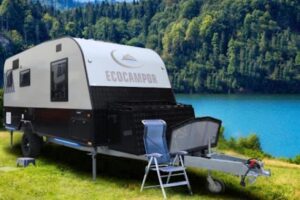Some folks, especially vanlifers, prefer not to have propane installed in their camper at all. These RVers rely fully on electricity for their power needs and might only use propane when using a portable camp stove outside during nice weather. Other RVers absolutely love the convenience and efficiency of propane and would refuse to own a camper without a full propane system.
This article is for the latter group. Today I’ll be walking you through some basic information about propane systems in RVs, and how to troubleshoot a system when your gas stops flowing.
How (and why) RVs Use Propane
At first glance, not many appliances in an RV look as though they use propane as a source of power. Most people spend so much of their time dwelling in modern houses that they just kind of assume all appliances run off electricity. This is not at all the case in most travel trailers and motorhomes.
The RV industry leans heavily on propane as a convenient and stable source of energy for powering RV appliances. What do I mean by stable? Well, RVers with propane systems are much less likely to accidently “drain” their power system by leaving an appliance on for too long.
An RV with two 20-pound propane tanks and a small solar set-up can power its appliances for weeks using the gas contained in those tanks and a trickle of energy from the sun. This is much longer than an electricity-only camper that might only last a day or two before needing a power hook-up or a bright, sunny day to recharge via solar.
Additionally, propane systems can withstand significantly colder temperatures than RV battery systems. RV batteries should not be allowed to reach a temperature below freezing, while propane systems can dip way into the negatives without a noticeable effect on the flow of gas.
RV Appliances That Use Propane
There are four main components in a camper that utilize propane as a source of power.
- Furnace: Most motorhomes and travel trailers utilize highly efficient propane furnaces as a primary source of heat. On average, an RV furnace consumes around one gallon of propane every 3 hours. This rate of consumption may be higher or lower depending upon outside temperatures, size of the RV, how air-tight the RV is, and what temperature the thermostat is set to.
- Water heater: Propane water heaters have the ability to heat water rapidly and sustain a consistent flow of hot water for showers and chores such as washing dishes and clothes. An RV water heater generally has a pilot light that burns a constant but insignificant amount of propane.
- Stove: Almost all older model RVs come equipped with a gas stove. Electric induction stovetops might be more energy efficient than gas models but in my opinion are not nearly as convenient or fun to cook on.
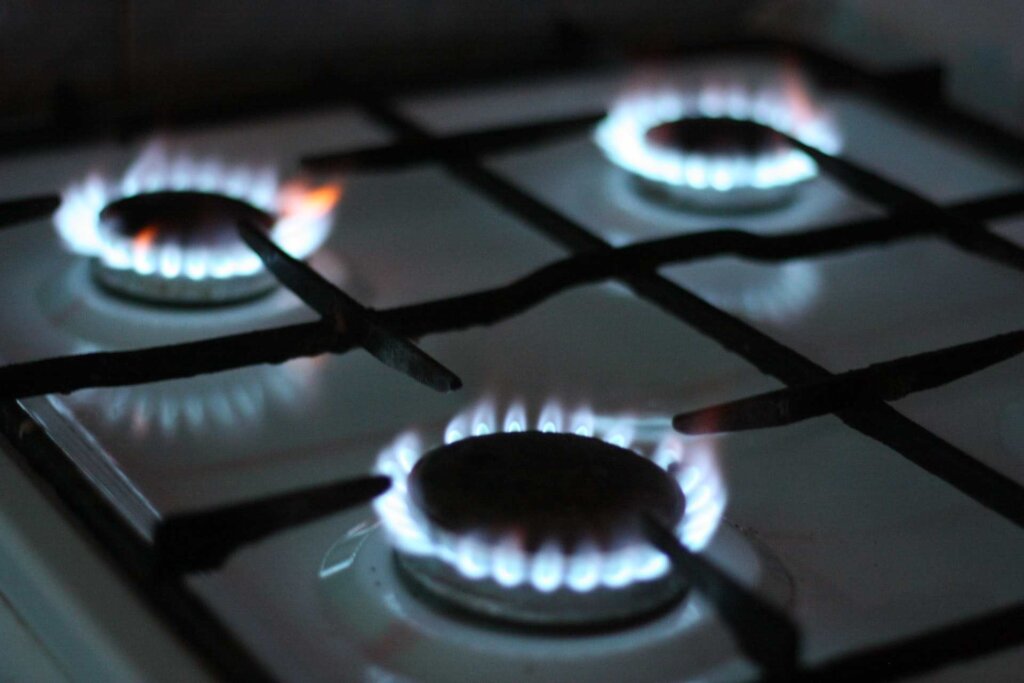
- Refrigerator: RV refrigerators are typically hybrids that can run on either propane or electricity. This dual power source feature prevents food from spoiling by allowing the fridge to switch to electricity if the rig runs out of propane. If your camper then also runs out of electricity you might be in a bit of a pickle, but at least your fridge will exhaust all potential power sources before shutting off.
RV Propane Laws and Regulations
Laws surrounding propane usage in RVs can vary quite a bit region to region and state to state. It would take me way too long to research and compile an accurate list of propane laws in each state, so instead I’m going to tell you a couple of things to think about and focus on when you do your own research.
- Driving with a propane valve open: In many parts of the USA, it is illegal to drive an RV with the propane valves open. In other parts of the country there are no laws specifically restricting it, but it is not recommended. Most veteran RVers agree that it’s safest to close all propane valves before driving.
- Refilling tanks: Travel around the states for a while and you’ll probably notice that refills are handled differently throughout the country. States have varying regulations when it comes to who can refill a propane tank and how to determine a full tank.
- Tank inspection: Tank inspections determine whether or not a propane tank is strong and in good enough condition to safely hold high-pressure propane gas. Having your propane tanks inspected regularly is incredibly important, and oftentimes required by law.
Staying Safe While Using Propane
On one hand, propane is an incredibly useful and convenient resource, and on the other hand it is a highly flammable, volatile, and dangerous gas. Propane must be regarded with caution and handled extremely carefully to avoid dangerous and life-threatening accidents. Please keep the following things in mind as you use propane in your RV.
- Keep propane tanks 10-15 feet away from open flames such as campfires.
- Provide ample ventilation when using propane appliances in an RV.
- Turn off main propane supply valve before repairing or removing a propane appliance.
- Shut off propane supply valves, pilot lights, and ignitors when refueling a motorhome or tow vehicle.
- Never use a gas stove burner as a source of heat.
- Do not paint propane tanks. Painting an RV propane tank covers important safety information and can cause the temperature of the tank to increase.
- Have tanks inspected and re-certified after buying a used camper.
- No amount of gas leakage is acceptable in a propane system. If you smell rotting eggs, that is a sign your propane system is leaking. If this happens, immediately evacuate the RV and if safe to do so, turn off the propane supply valve. Wait until you are safe distance (50 yards) away from the RV to use your phone and call local authorities to report the leak. Do not re-enter or attempt driving the vehicle until it has been inspected by emergency responders.
- Install and maintain smoke detectors and carbon monoxide detectors in your camper.
- Keep a fire extinguisher in your RV and have it easily accessible in case of emergencies.
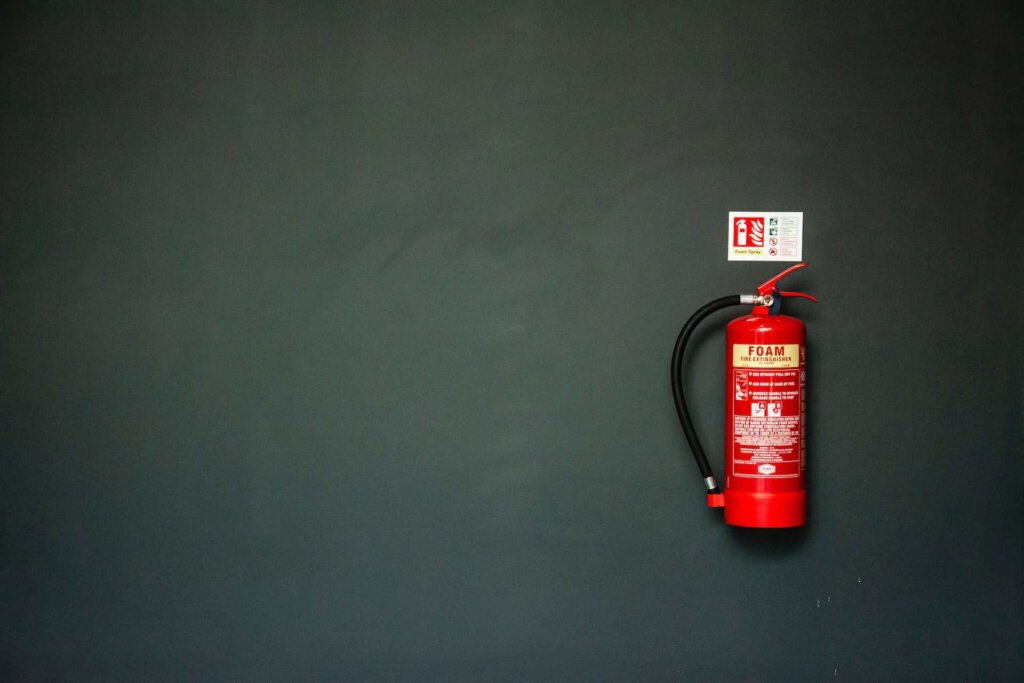
RV Propane Troubleshooting Guide
Problems with an RV propane system always strike at the worst times. Chances are, if you are realizing that your RV propane is not flowing, you are deep on some back road, camp is set up, cold drinks are in hand, and you’re hoping to get some dinner cooking. Certainly not the ideal time to discover an issue with your gas.
So, what is one to do?
Well, you might not be completely out of luck if you find your RV propane not flowing. There are four components in an RV’s propane system that can cause a lack of flow. Check them out first and see if one of these parts is the weak link in your system.
1. Primary Tank Valve
Checking that the primary propane tank valve is fully open should be the first step you take troubleshooting an issue with your propane system. I know it sounds pretty obvious, but you’d be surprised at how often someone’s propane “problems” are really just from a closed tank valve.
This is the type of issue where the solution is so simple, it is easily overlooked- especially when there are multiple people preparing an RV for a camping trip. Maybe you turned the RV’s propane on the night before to let the fridge and freezer get cold, but then your partner closed the valve before you started driving.
Or you were driving with the tank valve open and when you pulled into a gas station for some fuel, the gas station attendant closed the valve up before filling your tank. This is a standard safety practice and more than likely the attendant wouldn’t bother to inform you they closed your propane valve.
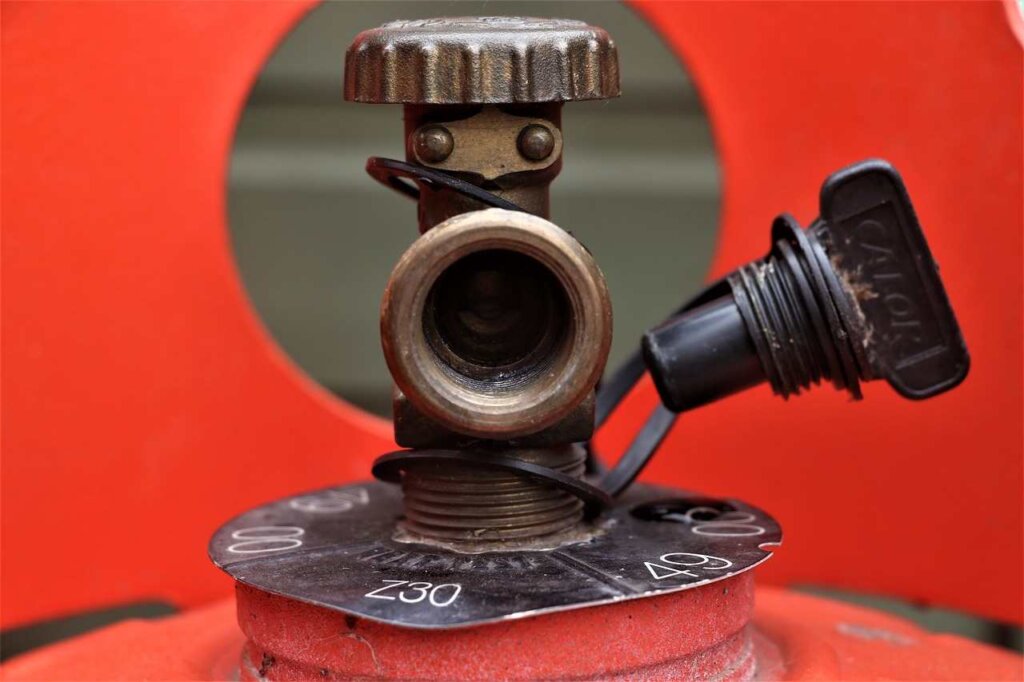
Regardless of how it happened, if you find that this is your issue simply open the valve nice and slow until it is fully open, and you should be good to go.
Safety tip: A propane tank’s main valve should always either be fully open, or fully closed. Most propane tanks have a seal that is only engaged when the valve is fully open. Leaving it in a partially open position can result in a dangerous gas leak.
2. Excess Flow Valve
An excess flow valve is a safety feature that regulates the flow of propane through a system and will stop the flow altogether if a leak is detected.
Inside the fitting is a spring-loaded ball valve. If gas flows rapidly or suddenly through the fitting, the valve engages and completely stops the flow of propane. The idea behind this device is that if there is a sudden, large gas leak, the system will automatically shut off the flow of propane and eliminate risk of fire or explosion.
But these devices are fickle little things, and they can be tripped by a non-emergency event such as… opening your tank valve too quickly. Seriously. Sometimes the act of opening the primary valve too quickly can trick the excess flow valve into thinking there is a leak, it panics, and shuts the system down.
While temporarily inconvenient, this is actually great news! If this is what has tripped your excess flow valve, then all you need to do is shut your main valve completely, turn off all propane-powered appliances, wait a few minutes, and then slowly reopen the main valve. You should be good to go.
If this doesn’t work, then you probably have a leak in your propane system and need to shut the primary valve immediately. An excess flow valve that continues to trip is indicative of a leak that needs to be fixed. From here your only option is to take your RV to a certified RV technician for repairs.
3. RV Propane Regulator
A propane regulator, also commonly called a pressure regulator, monitors and regulates the pressure of the propane gas as it comes out of the tank. It takes the high-pressure gas flowing out of the propane tank and lowers the pressure to a level that propane powered appliances can accept. Without a pressure regulator, most of a camper’s propane appliances wouldn’t be able to run properly.
But dealing with such high pressure all of the time is stressful, and these parts don’t always have the longest of lifespans. If a propane regulator has gone bad, it will need replacing.
Here are some signs that might indicate your propane regulator is bad:
- Stove burner flames are yellow or orange instead of a strong blue color
- Sooty residue around your burners
- Popping noises when stove burners are on
- Smell of gas leaking from the regulator itself
It’s also safe to assume your pressure regulator is bad if you know that it has ever been frozen completely (especially in humid environments) or dunked fully in water.
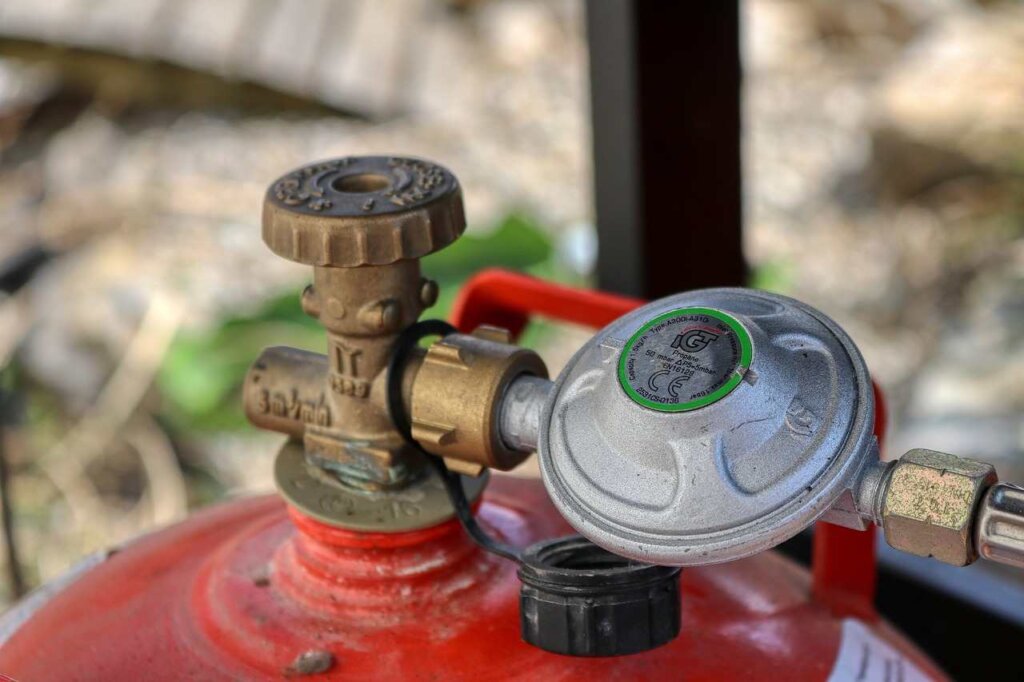
Before replacing the part entirely, you can attempt to reset the regulator by following the same steps taken to reset an excess flow valve. If the regulator cannot be reset, it will likely need to be replaced (don’t worry, they’re cheap).
4. Interior Propane Detector
Not all motorhomes and travel trailers have a propane detector, so this may or may not be relevant to your rig. (Pssst… if you don’t have a propane detector, you should get one!)
A propane detector’s only job is to detect if there is a propane leak somewhere in your RV and shut off the flow of propane if it senses one. It does this via an electric solenoid valve that requires electricity to stay open. If there is no power, the solenoid valve stays closed, and the propane won’t flow.
So, checking if your propane detector is your issue is pretty easy. Does your rig have power? If not, that’s your issue. If your batteries are charged and power is flowing to the rest of your rig, check the DC fuse-block and see if the fuse associated with the propane detector needs replacing. Fuse-block looking good? Move on to the wiring heading to the detector and make sure the electrical connections are secure.
If all of that checks out, and you are 100% positive you don’t have a propane leak, then you may need to take your rig to an RV technician and have them inspect your propane detectors internal wiring.
RV Propane Safety and Maintenance Tips
Staying on top of your propane system’s maintenance is essential to ensuring the safety of you, your crew, and your rig while you camp.
Replace Old Fire Extinguishers
Yes, fire extinguishers can expire, and when they do it’s very important to promptly replace them. Make sure your current extinguisher, and any replacement extinguishers are rated properly for the size of your RV and easily accessible. You, and anyone staying in the RV should know where all fire extinguishers are located and how to safely use them.
Smoke detectors, propane detectors, and carbon monoxide alarms should all be test regularly. Always have a backup stash of fresh batteries somewhere in the rig so you can replace a detector’s batteries if they go dead on a trip.
Detectors and alarms also have limited life spans and will need replacing every 5-10 years. Know when your detector’s replacement dates are and don’t push off replacing them when it’s time.
Schedule Professional Inspections
RV technicians recommend that an RV’s propane systems be thoroughly and professionally inspected once every two years. A technician will be able to go through your system, check for leaks, inspect that the individual components are up to date and in working order, and, if certified to do so, inspect and recertify old propane tanks.
Frequently Asked Questions
See what our readers want to know about their RV propane systems.
Why does my propane tank feel full but there is no gas?
Your propane tank probably just feels full because it is made with sturdy, heavy metal. Empty propane tanks are shockingly heavy.
How do I tell if I have a propane leak?
If you smell rotting eggs, your propane detector is alarming, your pressure regulator has shut the flow of gas, or your excess flow valve has shut the flow of gas, you may have a propane leak. Immediately shut the primary tank valve and fully evacuate the RV.
Is propane expensive?
This is a tough question to answer. Propane may seem expensive or inexpensive depending upon your specific your financial situation. At truck stops and convenience stores, refilling a propane tank costs in between $2-4. At campgrounds with refill stations, you may be looking to spend closer to $4-6 per gallon.
Conclusion
Propane should be respected but not feared. When handled safely and appropriately, RV owners should be able to utilize propane as a source of power for many years with no issues. But if you get careless and negligent with your propane system, you are asking for trouble.
Please be smart when operating propane-powered appliances in your rig. If you ever suspect you have a propane leak, close the primary tank valve and evacuate the rig. Call appropriate authorities and have your system inspected by a professional. Better safe than sorry.
Happy camping!


